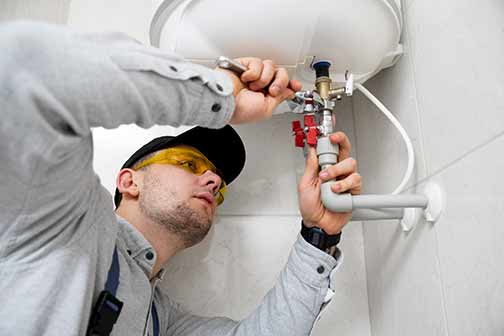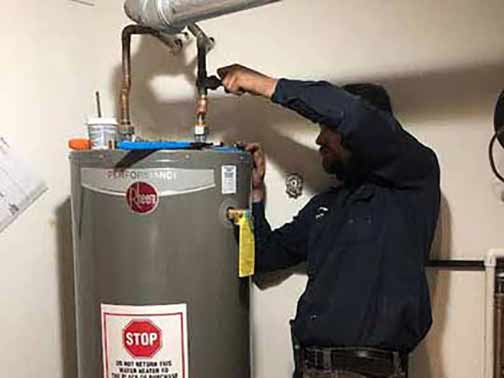
Water heaters are essential appliances in our homes, providing hot water for daily activities such as bathing, cooking, and cleaning. A malfunctioning water heater can disrupt your routine and cause significant inconvenience. Understanding the importance of a functional water heater is the first step in addressing any issues that may arise.
Identifying Common Water Heater Problems
Before you can fix your water heater, you need to identify the problem. Common water heater issues include:
- No Hot Water: If your water heater is not producing hot water, it could be due to a faulty heating element, thermostat, or a tripped circuit breaker.
- Inadequate Hot Water: If your water heater produces some hot water but not enough, it could be due to a malfunctioning thermostat, a buildup of sediment in the tank, or an undersized water heater.
- Water Temperature Too Hot: If the water temperature is too hot, it could be due to a faulty thermostat or a thermostat set too high.
- Leaking Water Heater: Leaks can be caused by a variety of issues, including a faulty temperature and pressure relief valve, a leaking tank, or loose plumbing connections.
- Strange Noises: Banging, popping, or rumbling noises can indicate sediment buildup in the tank or a malfunctioning heating element.
Safety Precautions Before You Begin
Before you start working on your water heater, it’s crucial to take safety precautions to protect yourself and your home. Here are some steps to follow:
- Turn Off the Power: For electric water heaters, turn off the power at the circuit breaker. For gas water heaters, turn off the gas supply.
- Shut Off the Water Supply: Locate the cold water supply valve and turn it off to prevent water from entering the tank.
- Drain the Tank: Attach a garden hose to the drain valve at the bottom of the tank and direct the hose to a floor drain or outside. Open the valve to drain the tank and release any built-up pressure.
- Wear Protective Gear: Wear safety goggles, gloves, and appropriate clothing to protect yourself from hot water and potential electrical hazards.
Step-by-Step Guide to Fixing Common Water Heater Issues
Once you’ve identified the problem and taken necessary safety precautions, you can begin fixing your water heater. Here is a step-by-step guide to address common issues:
No Hot Water
If your water heater is not producing hot water, follow these steps:
- Check the Power Supply: Ensure the circuit breaker is not tripped and the power switch is turned on.
- Inspect the Heating Elements: Use a multimeter to test the heating elements for continuity. If they are faulty, replace them.
- Test the Thermostat: Use a multimeter to test the thermostat for continuity. If it is faulty, replace it.
Inadequate Hot Water
If your water heater produces some hot water but not enough, follow these steps:
- Adjust the Thermostat: Ensure the thermostat is set to the appropriate temperature (typically between 120-140°F).
- Flush the Tank: Sediment buildup can reduce the efficiency of your water heater. Drain the tank and flush it with water to remove sediment.
- Inspect the Dip Tube: The dip tube directs cold water to the bottom of the tank. If it is damaged or broken, replace it.
Water Temperature Too Hot
If the water temperature is too hot, follow these steps:
- Adjust the Thermostat: Lower the thermostat setting to reduce the water temperature.
- Test the Thermostat: Use a multimeter to test the thermostat for continuity. If it is faulty, replace it.
Leaking Water Heater
If your water heater is leaking, follow these steps:
- Inspect the Temperature and Pressure Relief Valve: If the valve is leaking, it may need to be replaced.
- Check the Plumbing Connections: Tighten any loose connections and replace damaged pipes or fittings.
- Examine the Tank: If the tank itself is leaking, it may need to be replaced.
Strange Noises
If your water heater is making strange noises, follow these steps:
- Flush the Tank: Sediment buildup can cause noise. Drain the tank and flush it with water to remove sediment.
- Inspect the Heating Elements: Banging or popping noises can indicate a faulty heating element. Replace it if necessary.

When to Call a Professional
While many water heater issues can be fixed with basic tools and a little DIY know-how, some problems require the expertise of a professional. Here are some situations where you should call a professional plumber:
- Complex Repairs: If the issue is beyond your skill level or requires specialized tools, it’s best to call a professional.
- Gas Water Heaters: Working with gas water heaters can be dangerous. If you’re not comfortable handling gas lines, call a professional.
- Leaking Tank: If the tank itself is leaking, the water heater needs to be replaced by a professional.
- Electrical Issues: If you’re not experienced with electrical work, it’s safer to have a professional handle any electrical repairs.
Preventative Maintenance for Your Water Heater
Regular maintenance can help extend the life of your water heater and prevent future issues. Here are some preventative maintenance tips:
- Flush the Tank Annually: Draining and flushing the tank once a year can help remove sediment buildup and improve efficiency.
- Inspect the Anode Rod: The anode rod helps prevent corrosion inside the tank. Check it annually and replace it if it’s heavily corroded.
- Test the Temperature and Pressure Relief Valve: Ensure the valve is functioning properly by lifting the lever and allowing it to snap back into place.
- Check the Thermostat: Periodically test the thermostat to ensure it’s maintaining the correct temperature.
Summing It Up
Fixing your water heater can seem daunting, but with the right knowledge and tools, many common issues can be addressed quickly and safely. By identifying the problem, taking necessary safety precautions, and following a step-by-step guide, you can restore your water heater to proper working condition.
Remember to perform regular maintenance to prevent future problems and extend the life of your water heater. If you encounter complex issues or feel unsure about any repairs, don’t hesitate to call a professional plumber for assistance.

